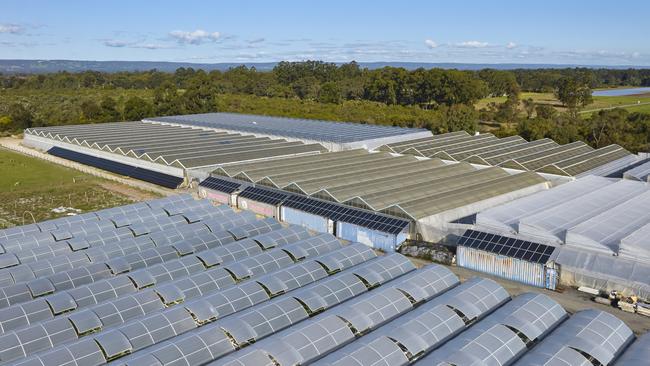Zeke Zalsman powering his family’s horticulture farm
A former commercial banker has returned to his family farm, finding an innovative way to heat their greenhouses and cut heating costs by 75 per cent.
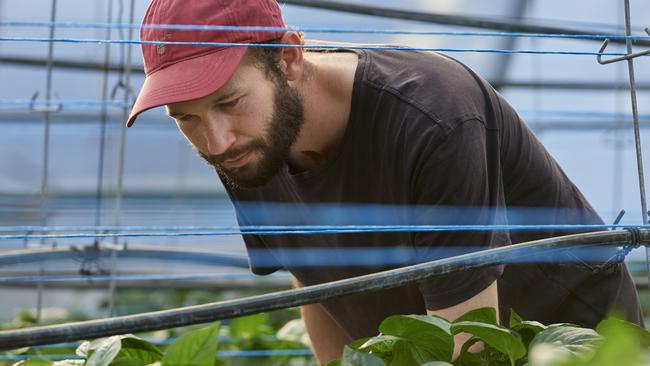
Zeke Zalsman never planned on returning to his family’s horticulture farm.
But it’s one of the best decisions the 32-year-old has made.
And his innovation, focus on sustainability and consistency has continued to develop the business.
Zeke is now at the helm of his family’s business, Zaldeesh Farms, based at Oldbury, just south of Perth in Western Australia.
Zaldeesh Farms specialises in producing capsicums, as well as pomegranates, basil and ginger.
Zaldeesh Farms was established by Zeke’s parents, David and Denyse, 30 years ago, growing capsicums in the field.
Zeke said they then started building greenhouses about 25 years ago and learnt the different features they needed for the unique Perth climate.
“In the summer, we get very extreme UV and extreme heat, and then when you come into winter, it gets quite cold and there’s not a heap of light hours,” he said.
“Dad is from Israel and when they came back to Perth, red capsicums weren’t really very popular and they tried a whole bunch of vegetables and decided they liked growing capsicums,” Zeke said.
And the decision has continued to be both a positive one and a challenge.
“Capsicums aren’t a common crop to grow in high tech spaces, particularly in Western Australia, and it is quite a fickle crop and can be hard to grow.
“But once we learnt the skills to grow them well, we liked growing them and have stuck with it.”
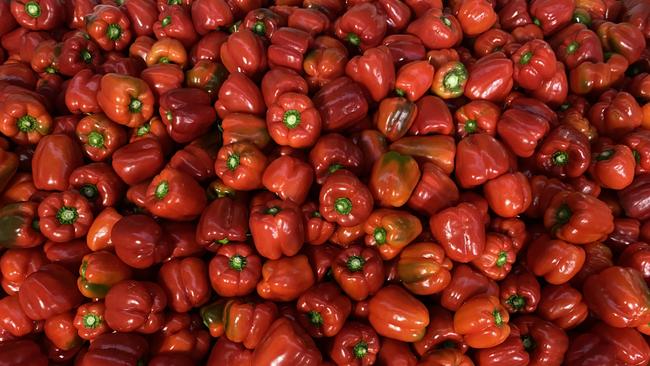
PUMPED UP
After working in commercial banking, which he didn’t find a lot of joy in, Zeke returned to the farm about five years ago.
While he didn’t think he would stay, he said he realised he actually loved it and is driven by having a quality product for consumers to enjoy.
And having his fresh approach and enthusiasm has meant he is tackling the issues of rising costs, sustainability and climate head on.
They manage these challenges with high-tech greenhouses with heating and cooling capabilities, shade screens that are automatically controlled based on radiation levels, and carefully managed recycled water irrigation system.
Since 2009 all capsicums have been grown in greenhouses. They have seven greenhouses, covering 3ha, where the produce about 400 tonnes of capsicums each year on 105,000 to 110,000 plants.
Capsicums are made up of 60 per cent red variety, then yellow and some orange, as well as mini snacking capsicums.
They also have 2000 pomegranate trees, grown in the field, which use the wastewater from the greenhouses because they can handle saltier water.
Zeke said they recycle all the water in the greenhouses, but at a certain point it has to be discarded and that is the water used on the pomegranates.
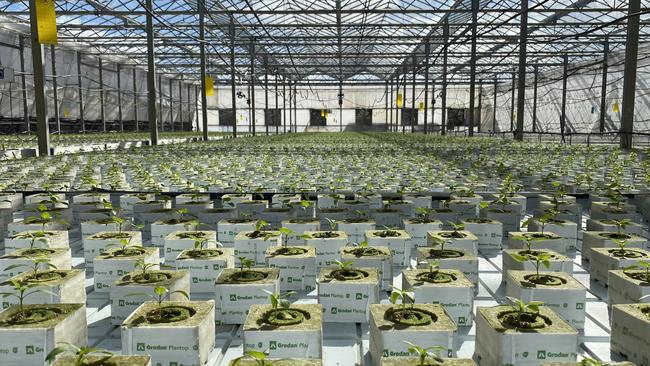
All seeding of capsicums is done in-house and seedlings are planted into rock wool, a volcanic rock substrate, which allows them to closely control nutrients and water each plant gets.
Water soluble fertiliser is applied, and every plant has its own dripper.
“Each plant gets what it needs with every irrigation,” Zeke said.
Irrigations are timed, depending on the UV, daylight hours, radiation and temperature.
“In summer plants could get irrigated every 45 minutes.”
Drainage of plants was also measured, and while they had a target range, if a plant was giving no drainage then they were likely being underwatered.
Shade screens are used in the greenhouses, to both keep heat in and block it out.
“In winter or on cool nights they are spread and they act as clouds, trapping the heat in, then they open during the day to let the light in, but we can also spread them during summer to reduce light,” Zeke said.
Heating and cooling the greenhouses is one of the key pillars of growing capsicums, but it is also the most significant cost to the business.
The cooling system includes evaporative cooling, high pressure foggers and sprinklers. It can get to 43C in summer and the greenhouses are kept to 28C.
In winter, temperatures get as low as 2C, and the greenhouses are heated up to 12C.
Heating is done by hot water circulated through pipes, so it heats the plant and root zone rather than the structure.
Previously, the system was heated by gas, which was set up when LPG cost 40c/litre.
“LPG prices kept going up and we started sacrificing our ideal temperature and running the greenhouses at a lower heating capacity,” Zeke said.
“As soon as you have to sacrifice your product, it just isn’t a good way to operate.”
This resulted in lost production, reduced quality product and an increase in disease, which prompted Zeke to look at new research for greenhouse heating.
As a result Zeke was the first grower in the country to commercially adopt heat pump technology for greenhouse heating, resulting in cost reductions and an increase in production and quality.
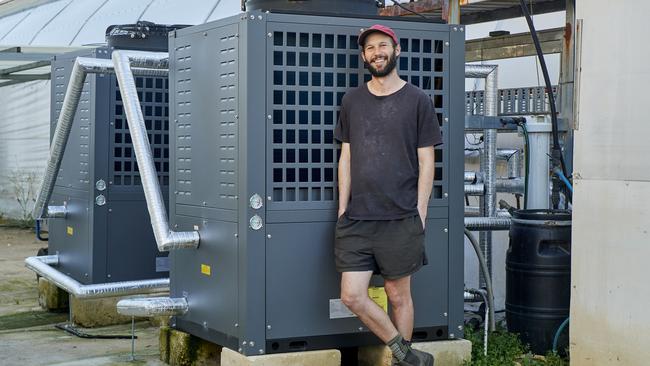
Heat pumps are a relatively new, highly efficient technology that is used in industrial hot water applications, such as heating public swimming pools and hotel hot water.
While they started with changing one greenhouse over to the heat pump system, Zeke said they have just finished the last greenhouse conversion.
“We can now focus on getting the ideal temperatures and not being conservative on heat.”
Zeke said the running cost of the heat pump system was 25 per cent of the LPG system, so they are saving 75 per cent on what they were.
While the capital costs were significant, Zeke said they would pay for themselves within five years.
Heating, cooling, shade screens and irrigation were all automated and settings were controlled through a combination of radiation, temperature, humidity and time.
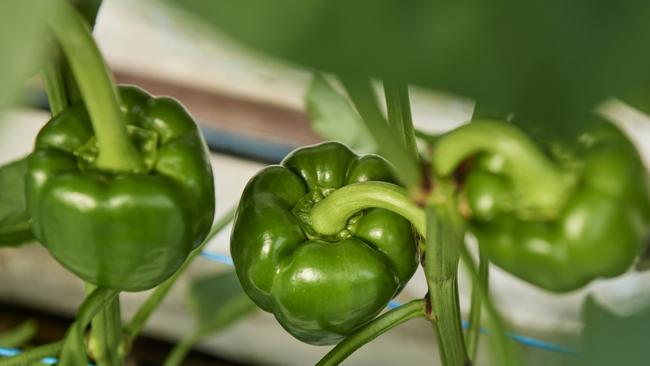
NON-STOP PROCESS
Capsicums are grown year-round and seedlings are planted into greenhouses at about four weeks old.
They take another nine to 10 weeks to start producing and production is continuous until they are pulled out after about 12 months.
Pests are managed by an Integrated Pest Management system, and as well as their own walk-throughs to check for pests and disease. A company called Biological Services visit weekly to walk through to check for pests and disease.
They then advise on any problems.
Zeke said they use as little spray as possible and try to let the predatory bugs manage issues.
He said if they do need to spray they could target one area or one row.
Picking is all undertaken by hand, starting with a once-a-week pick at the start of the season, before moving to twice a week in warmer months, and then back to once-a-week.
Zeke said they have a fairly consistent number of staff, ranging from 15 to 18.
Once picked, the capsicums are washed, brushed and graded into size and quality on-farm.
Pomegranate picking starts in early February and ends at the end of March.
Capsicum and pomegranates are sold predominantly to wholesalers and Bunbury Farmers Market.
Zeke said they have a strong following of loyal customers through the wholesalers.
“Quality is important and something we won’t sacrifice on.”
But when it came to price, he said that “the market dictates what we get” and uncertainty on returns due to large price fluctuations can make life difficult.
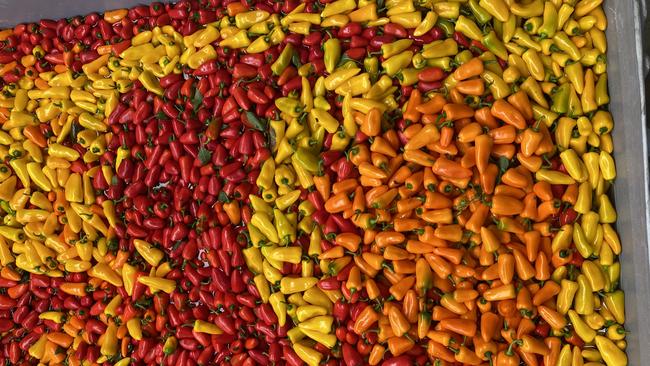
FAIR PRICING
To try to improve price consistency for him and other WA farmers, Zeke is in the process of establishing another business, Comuna Farms, a platform for connecting local producers to their consumers through a community-based buying model.
“The idea is about empowering farmers to set prices that better reflect their costs of production, and bridging the gap between them and their consumers. Our ultimate aim is to provide communities with greater access to high quality and affordable produce.”
Zeke said his interest in innovation came fairly naturally and he was always wanting to improve on things.
“We’ve tried diversifying with different crops and while it’s not necessarily worked for us, we might have learnt something about how to manage or get the best use of our technology by growing another crop that needs something different than capsicums do.“
Zeke said he likes producing a product people can enjoy and is striving to make the product the best it can be.
His passion for the industry and success so far was recognised at the Horticulture Awards for Excellence recently where he won the 2024 Corteva Agriscience Young Grower of the Year.
